Little Q: The practical significance is greater than the film itself.
Tips: This article has spoilers!
With the increasing number of families with pets, "animal movies" have become a popular type of film creation. Earlier, there were Hachi: A Dog’s Tale, Guide Dog Q, and in recent years, there were The Secret Life of Pets, Love Without Words and A Dog’s Purpose. Directed by Wing-cheong Law and starring Yam Tat-wah, Liang Yongqi and Luo Zhongqian, Xiao Q tells the story of Xiao Q, a guide dog.
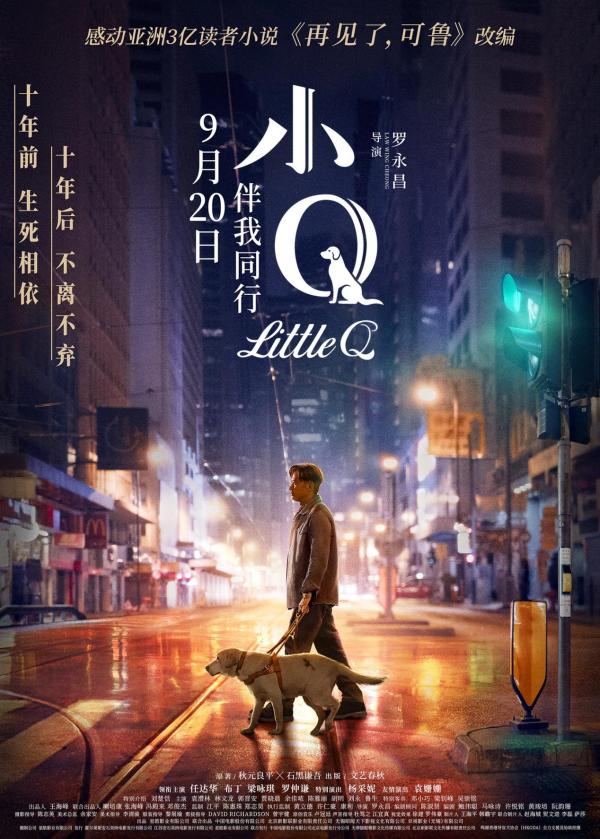
"Little Q" poster
"Little Q" is adapted from the novel Goodbye, Keru by Japanese writer Ishiguro Kengo. It tells the story that Keru (Little Q) served Mr. Watanabe, who was blind in middle age, after he became a guide dog, but his owner died two years later, and Keru was sent back to the training center to become a guide dog demonstrator in the training base. After retiring, he returned to the foster family and eventually fell ill and died. After its publication in Japan, the book caused a sensation and became a best seller. In 2003, it was introduced and published in mainland China, which also touched many readers. In 2004, Japan released the film "Guide Dog Little Q" (starring Kobayashi Kaoru) adapted from the novel of the same name, which broke through 2 billion yen at the box office in Japan, and the market income was very successful. Douban scored 8.4 points.
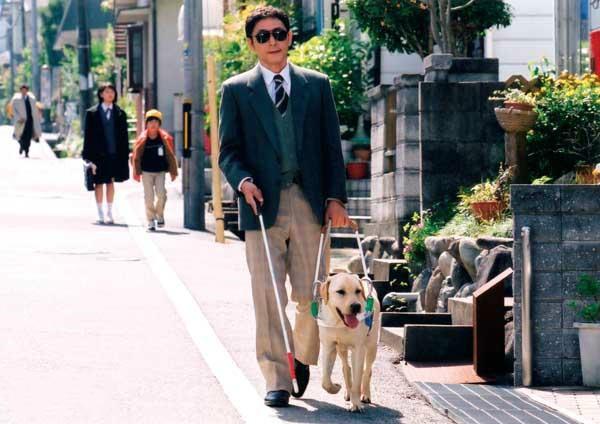
Stills of the Japanese film "Guide Dog Little Q"
Both Little Q and Little Q for Guide Dogs are adapted from the novel Little Q for Guide Dogs. On the basis of the novel, "Little Q" has made localized changes, and it is also significantly different from the film "Little Q for Guide Dogs".
Xiao Q tells the story that Xiao Q, a guide dog, and Li Baoting (Yam Tat-wah), the hero, know each other and love each other. The first main line of the film is the personal biography of guide dog Xiao Q, which records his loyal, docile, professional and conscientious life.

Young little q
Xiao Q is a clever Labrador retriever. After birth, he was sent to an adoptive family for training for one and a half years. After strict testing and screening, he became a guide dog. The film shows the whole process of training qualified guide dogs: how they understand instructions under training; How to overcome all kinds of temptations and tests; How to establish a pairing with visually impaired people who need help; How to win the master’s recognition, trust and love step by step with their loyalty, trust and ability, and finally trust each other until the guide dog retires.
It’s hard for the audience not to be moved by Xiao Q. Although guide dogs are not pets, the audience who keep pets can easily substitute Xiao Q for their own pets. Viewers who don’t have pets will also be infected by Xiao Q’s loyalty. In the film, Li Baoting didn’t accept Xiao Q at first, driving away or even "abusing" Xiao Q, but he decided that Li Baoting was his own master. Xiao Q never abandoned him and still accompanied and guarded Li Baoting silently. Li Baoting needs to go to the United States for surgery due to physical reasons, so he can’t take Xiao Q with him. After a long time, Xiao Q can’t forget his master. Like a loyal dog Hachi, he often comes to the park bench where he once played with Li Baoting and lies there waiting quietly.
Whether it is a cat or a dog, its life span is generally 10-15 years. In the life of most cats or dogs, there is only one owner. They dedicate their lives to their owners, but they are only a small part of their lives. Moreover, the absolute trust and loyalty of cats or dogs to their owners is difficult for us to find a correspondence between people. This sharp contrast between "a completely loyal life" and "a small part of one’s life" is as touching as affection or love. Therefore, many people with pets should prepare paper towels when watching pet movies.
The relationship between guide dogs and their owners may be closer and more interdependent than that between pets and their owners. Because guide dogs are the eyes of the visually impaired, they spend most of their time together and blend into each other’s lives.
Another main line of the film "Little Q" is about people and Li Baoting, the owner of Little Q. This is a big change of Little Q from the Japanese version.
Li Baoting was originally a talented pastry chef with wide popularity. But because of the accident, my eyes gradually became blind. This is an unacceptable blow to chefs who devote their lives to cooking and rely heavily on the "five senses". Li Baoting, who was harsh, withdrawn and grumpy, was even more inhuman. He wrapped himself up, drank all day, was decadent and refused to be cared for by others. He is sarcastic to his friends, harsh to his younger sister and disciples, and unkind to others … … In short, there are thorns all over the body.
At first, Li Baoting didn’t accept Xiao Q at all, perhaps because he didn’t admit defeat, and he didn’t want to admit the fact that he couldn’t see. Therefore, Xiao Q was "abused" for the first three days when he sent her a match — — Li Baoting didn’t take Xiao Q to the toilet, didn’t feed him, and even dragged Xiao Q to drive him out. On a rainy night, Xiao Q did not leave, but lay under the car in front of the door and quietly looked at the window of Li Baoting’s room.
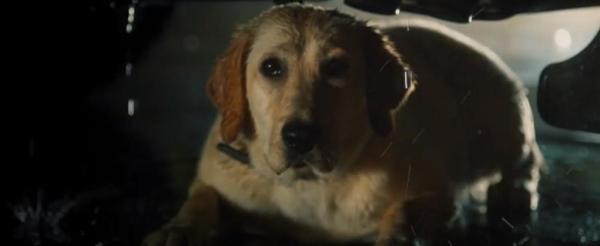
Even if Xiao Q is driven away by Li Baoting, he still waits silently.
No matter how rude and indifferent Li Baoting is to Xiao Q, what Xiao Q gives Li Baoting is to protect the Lord, be loyal, be professional and be conscientious. Slowly, Li Baoting opened her heart and accepted Xiao Q.
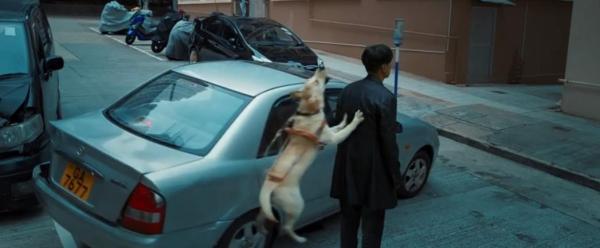
Little q lay down his life as savior
He took Xiao Q to the toilet on time and quipped that it is his new life to take him to the toilet now. Feed it on time; Take it for a walk and play with it … … In this process, Li Baoting has also changed. Xiao Q made his life full, meaningful and interesting. He found himself again, became cheerful and soft, and a smile reappeared on his face. Finally, Xiao Q became Li Baoting’s "silly niece", and Li Baoting also gave back to Xiao Q’s loyalty, trust, care and love. When Xiao Q came to the end of his life, Li Baoting took care of Xiao Q in turn.
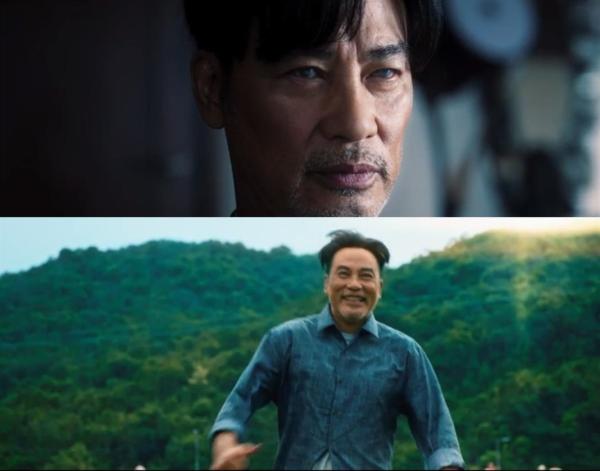
Li Baoting’s life has changed because of Xiao Q, and her face is smiling again.
Xiao Q not only guides Li Baoting, but also guides his life. Compared with the Japanese version, the emotional relationship between Li Baoting and Xiao Q in Xiao Q has a stronger emotional impact. This is the advantage of the film, but also brings the disadvantages of the film.
Some of the bridges in Little Q are set too deliberately and emotionally, thus sacrificing logic and rationality. For example, when Xiao Q left the foster family, the young master Chen Zhiqiao (Liu Chutian) ran out to chase the car to bid farewell and fell down, which was very old-fashioned. Later, Li Baoting went to the United States for surgery, and became Xiao Q who ran after the car all the way and almost had an accident. The screenwriter wanted to highlight Xiao Q’s loyalty, but this was contrary to the specialty of guide dogs. A more exaggerated bridge is that Li Baoting took Xiao Q to Guangzhou to visit his teacher, and Xiao Q was robbed in the middle. Li Baoting risked his life to save Xiao Q, and the screenwriter ridiculed the dog meat festival by the way. For the time being, regardless of the suspension of saving the dog, the right and wrong of the dog meat festival is far from being so one-sided as shown in the film.
Personal position first, it is inevitable that it will be biased. Therefore, it is necessary to make an important common sense distinction here: guide dogs are not pet dogs; Just because guide dogs are not aggressive does not mean that pet dogs are not aggressive; Supporting guide dogs does not mean supporting all demands of dog lovers; Love dogs is freedom, and dislike dogs is personal freedom.
From the film point of view, Little Q is a work that is too sensational and not rigorous in logic, but has a smooth overall rhythm and exquisite performance. Xiao Q deserves a "movie queen", and Yam Tat-wah can fight for another Academy Award. The aesthetic significance of the film is not great, but its significance lies in the social level.
On the one hand, movies will deepen the public’s understanding of guide dogs. Needless to say, the popularity of guide dogs in China is very late. With the holding of the 2008 Beijing Paralympic Games as an opportunity (foreign disabled athletes took guide dogs to participate), guide dogs entered the public eye. Over the years, news about guide dogs has appeared in newspapers from time to time, but most of them are rejected when visually impaired people take guide dogs on public transport or enter public places such as hotels.
Fear of guide dogs is due to lack of common sense about guide dogs. In fact, guide dogs have special requirements for dog breeds, and mainly choose dogs with high IQ such as Labrador, Golden Retriever and German Wolfhound. The training technology of guide dogs is quite mature, and the requirements are extremely high (they will not bark for no reason, can withstand the temptation of food, are not afraid of gunshots, and are highly focused, etc.). In the end, they will pass the test of "one in a hundred" and will be eliminated immediately once their bad habits are exposed, so the number of guide dogs is very limited; Guide dogs are docile and not aggressive (three generations are required to have no record of attacking people when screening) … …
Guide dogs are working dogs, and their working life can reach 8-10 years. However, many guide dogs have injuries when they retire because of their extremely long working hours, high work intensity and their ability to hold their urine and resist hunger. Guide dogs are a typical example of selfless dedication, but their social acceptance is very low. Many places still refuse to let guide dogs enter public places, and some individuals are biased against guide dogs, which is regrettable.
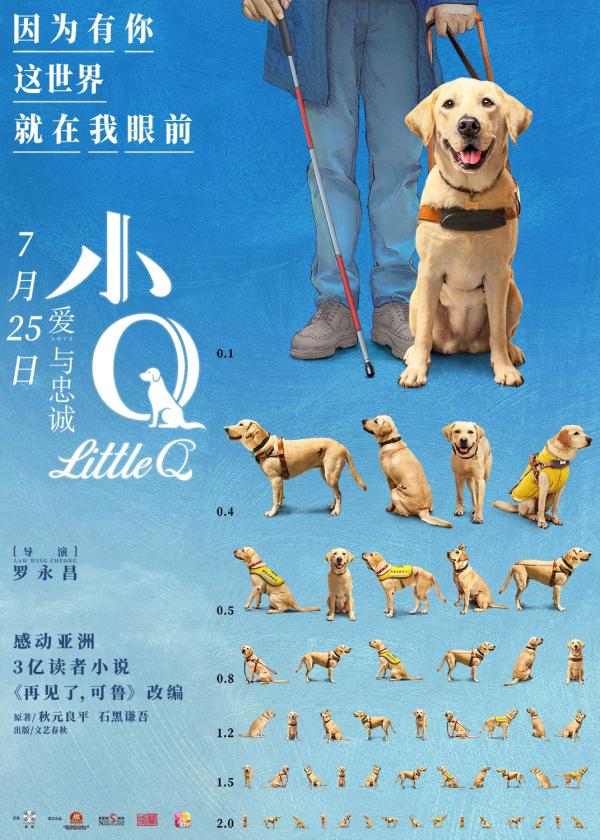
Please throw away your prejudice against guide dogs and give them more kindness.
On the other hand, movies can also attract more people’s attention to the rights and interests of the visually impaired. There are more than 17 million visually impaired people in China, but the probability of meeting them in real life is very low, because most of them can’t go out. For example, although barrier-free facilities in most cities are well established, it is very common to occupy blind roads because of lack of common sense and insufficient publicity. Another example is that the number of guide dogs in service in Chinese mainland is less than 200, and the popularity of guide dogs in China is extremely low. This is mainly because a guide dog is trained to be about 150,000 yuan, and the guide dog is provided to the visually impaired for free. The government’s investment is limited, and the development of the guide dog business is slow.
The background of a society’s civilization is not only reflected in high-rise buildings, but also in its humanistic care for the elderly, the weak and the sick. If Little Q can let more people know about guide dogs and learn to respect the rights and interests of people with disabilities, the significance of this film will be achieved. (Zeng Yuli)